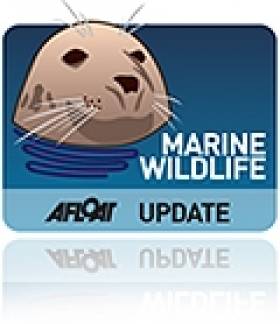Displaying items by tag: Black Swan
A member of the 1983 America’s Cup winning crew has visited Skerries Sailing Club to follow a lead on a rare team flag that went missing when Australia II won the Auld Mug.
According to ABC News, the ‘boxing kangaroo’ flag was thought to have been secreted away from a support boat, the Black Swan, amid the celebrations in Newport, USA for John Bertrand and crew’s victory — and the United States’ first loss in the America’s Cup to that date.
The search for the missing flag picked up steam after a native of Bunbury, south of Perth and Fremantle in Western Australia, spotted the framed flag while at a wedding reception in Skerries SC.
Grayden Thompson recalled a speech given in Bunbury in 1983 by the Black Swan’s Newton Roberts in which the late deckhand lamented the loss of the flag — and subsequently learned of the local legend of its provenance.
Alas the ‘boxing kangaroo’ that Skerries has hosted since the 1980s is not the missing banner that’s flummoxed Australia’s sailing community for decades.
This was confirmed when Ken Judge, starboard trimmer on Australia II, travelled to the north Co Dublin sailing club to inspect the flag.
But it has sparked a mystery of its own, as its markings don’t match those of other commercially produced flags of the time — and it may even originate from the America’s Cup defence off Fremantle in 1987.
ABC News has more on the story HERE — and it’s also been covered by ABC Radio Darwin.
This story was updated to add a link to the radio segment.
Black Swan Bedazzles Birdwatchers in Belfast
#BlackSwan - A rare black swan has been spotted in the wild making its home in Northern Ireland, as BBC News reports.
The species, which is native to Australia, has never before been seen in the wild on this island. But a female black swan has recently been seen at the Waterworks public park in north Belfast, astounding local bird enthusiasts.
The bird is presumed to be an escapee from a private waterfowl collection, but as local 'twitcher' Aidan Crean enthused, she's a more than welcome addition to Belfast's urban wildlife.
"We have coots, moor hen, mallards, about 100 black headed gulls that have come in from Belfast Lough, a couple of mute swans and in the middle of it all an amazing black swan, pure black with a red bill," he said.
BBC News has much more on the story HERE.





























































